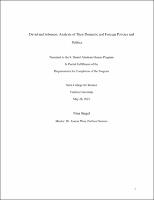Please use this identifier to cite or link to this item:
https://hdl.handle.net/20.500.12202/6928| Title: | David and Solomon: Analysis of Their Domestic and Foreign Policies and Politics |
| Authors: | Phua, Joanna Siegel, Nina |
| Keywords: | diplomacy King David Davidic dynasty domestic policy foreign policy |
| Issue Date: | May-2021 |
| Citation: | Siegel, Joanna. "David and Solomon: Analysis of Their Domestic and Foreign Policies and Politics." Undergraduate thesis, Yeshiva University, May 2021. |
| Abstract: | This thesis begins by discussing the political theory of realism and its subsections of classical realism, structural realism, and offensive and defensive realism. Once the theoretical foundations are established, the paper continues by analyzing the domestic and foreign policies of King David, whose domestic policy was characterized by the primary objective of unifying Israel by combining the two kingdoms of Judah and Israel (II Samuel 2:1-3) and establishing the capital of a united Israel in Jerusalem (II Samuel 2:5), which influences his foreign policy. While dealing with internal turmoil and realignment, David’s foreign policy initially began with defensive wars (I Chronicles 14, 18), which eventually led to stability that allowed for successful, aggressive offensive conquest (II Samuel 8:1-14). David’s foreign policy can be characterized and explained by the theory of offensive realism. Based on the backdrop that David established, King Solomon began his kingship as the first successor in the Davidic dynasty. David’s offensive realism enabled Solomon to engage in a completely different political framework. The military efforts exerted by David and diplomatic marriages to expand, unify, and stabilize Israel enabled Solomon’s foreign policy to be rooted in classical diplomacy, with focus on acquiring soft power through strategically motivated marriages and infrastructure partnerships. David and Solomon’s regimes provide early examples of domestic policy deeply impacting both foreign policy and international relations. Additionally, David’s political structure is evaluated for uniquely impacting and shaping his dynastic successor’s Solomon’s reign. Lastly, this paper concludes with evaluating the success of David and Solomon’s regimes in regard to power. |
| Description: | Senior honors thesis / 2-year embargo |
| URI: | https://hdl.handle.net/20.500.12202/6928 |
| Appears in Collections: | S. Daniel Abraham Honors Student Theses |
Files in This Item:
| File | Description | Size | Format | |
|---|---|---|---|---|
| Siegel May 2021 Embargo THESIS FINAL May 2021.pdf | 229.6 kB | Adobe PDF |  View/Open |
This item is licensed under a Creative Commons License

